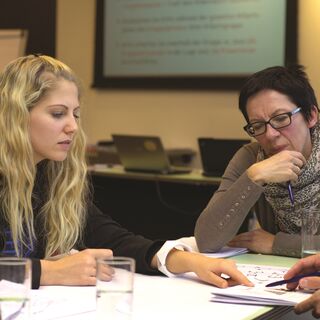Career
Understanding Power to Become More Powerful at Work
The meaning and nature of power at work are examined.
Posted October 29, 2021 Reviewed by Vanessa Lancaster
Key points
- Power can be defined in terms of dependence—i.e., one party being more dependent on the other than vice versa.
- Though people may view power as a negative, power put to good use can have many benefits (e.g., increased positive emotions, creativity).
- Power is not as static as it appears. It can challenge extreme, seemingly stable power imbalances (e.g., abusive supervision).

As employees and employers, we are all engaged in power games—whether we like it or not or are even aware of it. The good news is that there are ways to succeed at power games and become more powerful at work. But how?
In this post, I use the term “powerful” to describe a person in a high-power position or role and “powerless” for a person in a low-power position or role. These terms are relative, not absolute (i.e., even the “powerless” have some power).
Defining Power at Work
We could define power as physical strength, the ability to impose one’s will or the production “production of intended effects.” In social psychology, however, a common definition of power is, “Asymmetric control over valued resources in social relations.”
Asymmetry: Power involves an imbalance in influence and dependency. The powerless party is more dependent on the powerful one; the latter is more independent and has more interpersonal influence. Therefore, the powerless person who intends to become less dependent on the more powerful party would need to find alternative ways to get what he or she desires (e.g., obtain money and status through other relationships).
Valued resources: Power concerns access to or possession of valued resources such as money and status—see my post on the six bases of power. It is important to remember value is partly subjective. For instance, a senior staff with the power to give an employee a promotion has no power over an employee who does not value getting promoted.
Feeling Powerful and Using Power Wisely
Sturm and Sharma in Organizational Dynamics offered suggestions about becoming more powerful at work.
Sharma and Sturm distinguished feeling powerful from being powerful. A very powerful person (e.g., money and connections) does not necessarily feel very powerful. But feeling powerful is important. Why? Because those who feel powerful also feel more self-confident, optimistic, willing to take risks, and willing to approach rewarding opportunities. Such feelings of power might convince others that one is indeed powerful—even if, objectively, not so.
Despite the benefits of power, some individuals fear or dislike power, justifying their dislike by pointing to incidents where people with power and status at work caused harm—e.g., ignored the rules, did not cooperate with others, or engaged in workplace bullying.
Yet, power is also associated with action, focus, goal setting, creativity, positive emotions, and lower stress. Indeed, whether power is linked with positive or negative outcomes is related to how power is used.
For example, when given more power, people focused on helping others become more altruistic; individuals who look at relationships in terms of exchanges, in contrast, become more selfish and more inclined to take advantage of others.
Despite knowing the benefits of feeling empowered, some individuals who desire power are still reluctant to engage in power games because they think power is static (i.e. the powerless will remain powerless). However, power is more fluid than it appears, as explained below.

Static power, fluid power, and abuse
As described in a seminal paper by Emerson, power dynamics may be changed toward power equilibrium in one of four ways (Wk: weaker party; St: stronger party):
- Wk becomes less invested in goals that necessitate St’s involvement (i.e. in a way, withdrawing from the relationship).
- Wk finds alternative methods of satisfying desired goals, thus depends less on St (e.g., through extending his or her network).
- Wk makes St more invested in goals that require the help of Wk (e.g. by increasing the value of these goals to St).
- Wk deprives St of alternative methods of achieving desired goals (e.g., through forming a coalition).
This theory has been used in research on effective ways to deal with abusive supervision—handling abusive supervisors who deceive, insult, or threaten employees:
Abused employees often feel powerless because they can see only a static imbalance of power; after all, victimized employees are dependent on their abusive supervisors for job security and career advancement.
In reality, however, employees do have the power to challenge workplace bullies and redress the power imbalance, as Emerson suggested. How? For example, by working together and creating a united front. In this way, victimized employees can disrupt the abusive power dynamics and show management just how essential they really are (e.g., in terms of their unique experience and skills).
Empowering Employees
Powerlessness at work, whether due to organizational factors or workplace bullying, is a real problem for employees and employers. Indeed, in many organizations, leaders and supervisors use a variety of approaches to empower their employees because they know powerless employees are not motivated or capable of giving their best.
Of course, employers may not know how to empower their employees. For instance, being overly or inappropriately supportive of an employee’s autonomy and agency could inadvertently further disempower the employee. Empowering employees also requires trust in their ability and integrity, which may be in short supply. Simply put, there are several obstacles to empowering employees.
The good news is there are ways for employees to empower themselves, by leveraging personal and relational sources of power. These are discussed in my next post.




